-
 Trump says not 'ripping' down Kennedy Center -- much
Trump says not 'ripping' down Kennedy Center -- much
-
Sunderland rout 'childish' Burnley

-
 Musk merges xAI into SpaceX in bid to build space data centers
Musk merges xAI into SpaceX in bid to build space data centers
-
Former France striker Benzema switches Saudi clubs

-
 Sunderland rout hapless Burnley
Sunderland rout hapless Burnley
-
Costa Rican president-elect looks to Bukele for help against crime

-
 Hosts Australia to open Rugby World Cup against Hong Kong
Hosts Australia to open Rugby World Cup against Hong Kong
-
New York records 13 cold-related deaths since late January

-
 In post-Maduro Venezuela, pro- and anti-government workers march for better pay
In post-Maduro Venezuela, pro- and anti-government workers march for better pay
-
Romero slams 'disgraceful' Spurs squad depth

-
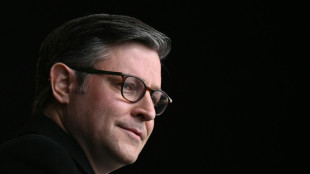 Trump urges 'no changes' to bill to end shutdown
Trump urges 'no changes' to bill to end shutdown
-
Trump says India, US strike trade deal
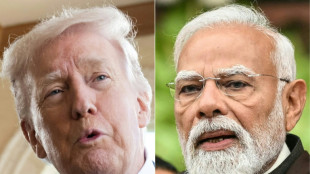
-
 Cuban tourism in crisis; visitors repelled by fuel, power shortages
Cuban tourism in crisis; visitors repelled by fuel, power shortages
-
Liverpool set for Jacquet deal, Palace sign Strand Larsen on deadline day

-
 FIFA president Infantino defends giving peace prize to Trump
FIFA president Infantino defends giving peace prize to Trump
-
Trump cuts India tariffs, says Modi will stop buying Russian oil
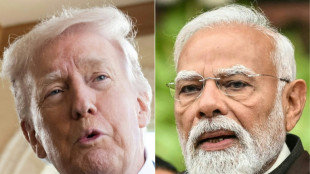
-
 Borthwick backs Itoje to get 'big roar' off the bench against Wales
Borthwick backs Itoje to get 'big roar' off the bench against Wales
-
Twenty-one friends from Belgian village win €123mn jackpot

-
 Mateta move to Milan scuppered by medical concerns: source
Mateta move to Milan scuppered by medical concerns: source
-
Late-January US snowstorm wasn't historically exceptional: NOAA

-
 Punctuality at Germany's crisis-hit railway slumps
Punctuality at Germany's crisis-hit railway slumps
-
Gazans begin crossing to Egypt for treatment after partial Rafah reopening

-
 Halt to MSF work will be 'catastrophic' for people of Gaza: MSF chief
Halt to MSF work will be 'catastrophic' for people of Gaza: MSF chief
-
Italian biathlete Passler suspended after pre-Olympics doping test

-
 Europe observatory hails plan to abandon light-polluting Chile project
Europe observatory hails plan to abandon light-polluting Chile project
-
Iran president orders talks with US as Trump hopeful of deal

-
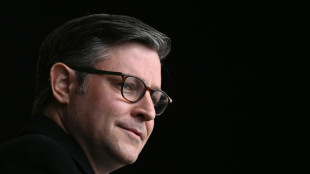 Uncertainty grows over when US budget showdown will end
Uncertainty grows over when US budget showdown will end
-
Oil slides, gold loses lustre as Iran threat recedes

-
 Russian captain found guilty in fatal North Sea crash
Russian captain found guilty in fatal North Sea crash
-
Disney earnings boosted by theme parks, as CEO handover nears

-
 Sri Lanka drop Test captain De Silva from T20 World Cup squad
Sri Lanka drop Test captain De Silva from T20 World Cup squad
-
France demands 1.7 bn euros in payroll taxes from Uber: media report
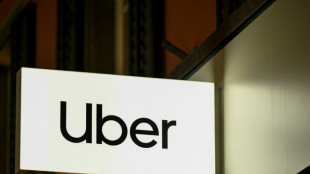
-
 EU will struggle to secure key raw materials supply, warns report
EU will struggle to secure key raw materials supply, warns report
-
France poised to adopt 2026 budget after months of tense talks

-
 Latest Epstein file dump rocks UK royals, politics
Latest Epstein file dump rocks UK royals, politics
-
Arteta seeks Arsenal reinforcement for injured Merino

-
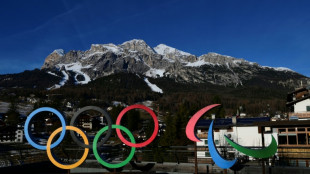 Russia uses sport to 'whitewash' its aggression, says Ukraine minister
Russia uses sport to 'whitewash' its aggression, says Ukraine minister
-
Chile officially backs Bachelet candidacy for UN top job

-
 European stocks rise as oil tumbles, while tech worries weigh on New York
European stocks rise as oil tumbles, while tech worries weigh on New York
-
England captain Itoje on bench for Six Nations opener against Wales

-
 Rahm says golfers should be 'free' to play where they want after LIV defections
Rahm says golfers should be 'free' to play where they want after LIV defections
-
More baby milk recalls in France after new toxin rules

-
 Rosenior will not rush Estevao return from Brazil
Rosenior will not rush Estevao return from Brazil
-
Mercedes ready to win F1 world title, says Russell

-
 Germany hit by nationwide public transport strike
Germany hit by nationwide public transport strike
-
Barca coach Flick 'not happy' with Raphinha thigh strain

-
 WHO chief says turmoil creates chance for reset
WHO chief says turmoil creates chance for reset
-
European stocks rise as gold, oil prices tumble

-
 Rink issues resolved, NHL stars chase Olympic gold at Milan
Rink issues resolved, NHL stars chase Olympic gold at Milan
-
S. Korea celebrates breakthrough K-pop Grammy win for 'Golden'

Web-tracking 'cookies' meant to protect privacy: inventor
The data-tracking "cookies" at the heart of concerns over online privacy were meant to shield people, rather than serve as cyber snoops, their inventor told AFP.
California-based engineer and entrepreneur Lou Montulli said the original "cookie" he created decades ago was intended to make life online easier by letting websites remember visitors.
Yet the technology has become a lightning rod, attacked for helping tech companies collect data on consumers' habits key to the targeted web ad business that makes many billions of dollars per year.
"My invention is at the technological heart of many of the advertising schemes, but it was not intended to be so," said Montulli, who created them in 1994 while an engineer at Netscape.
"It is simply a core technology to enable the web to function," he said.
Google joined a growing list of tech companies this week by announcing a new plan to block certain types of cookies, after the online ad giant's previous proposals were roundly criticized.
When discussing his invention, Montulli said the software snippets that let a website recognize individuals helped make possible features such as automatic log-ins or remembering the contents of e-commerce shopping carts.
Without what are called "first-party" cookies -- which also are used by websites to interact directly with visitors -- every time a person went online, they would be treated as though it were their first time.
But Montulli pointed to trouble with so-called "third-party" cookies, those generated by websites and tucked into visitors' browsers, and ad networks that aggregate data from those snippets.
"It is only through collusion between many websites and an ad network that ad tracking is allowed to happen," Montulli argued.
Websites share activity data with ad networks, which then use it to target ads for all their members.
- Online ads arms race -
"If you search on some strange niche product and then you get bombarded with ads for that product at a number of websites, that is a weird experience," Montulli said.
"It is normal human pattern recognition to think if they know I was looking for blue suede shoes, they must know everything about me; then think I want to get out of this."
Governments have taken notice, with the latest consequence being French authorities fining Google and Facebook 210 million euros ($237 million) this month over their use of cookies.
If one website in a network also collects personally identifying information about a user, say a name or email, that could be "leaked" in a way that enables a browser to be associated with a person.
"It's a network effect of all these different websites colluding together with the ad trackers," Montulli said. "Cookies were originally designed to provide privacy."
He said one possible response would be to stop targeting ads and start charging subscriptions for online services, which run on online advertising revenue.
Montulli also supports phasing out third-party cookies, but warned getting rid of the software snippets altogether would drive advertisers to employ more stealthy tactics.
"Advertising will find a way," he said. "It will become a technological arms race; considering the billions of dollars at risk, the ad industry will do what they need to keep the lights on."
Turning off third-party cookies could also unintentionally punish small websites by shutting them out of targeted ads that make money, giving even more power to tech giants such as Apple, Google and Facebook-parent Meta.
Regulation that keeps cookies in use, mandating controls such as letting users opt in or out of sharing data, may be the only viable long-term solution, Montulli said.
"You really couldn't use the web without cookies," he said. "But, we are going to need to be more nuanced about how they are used in advertising."
I.Meyer--BTB


